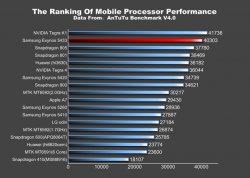So, sales numbers are in. Despite very limited supply and China not being in the initial rollout, Apple sold more iPhones than last year's opening weekend (that didn't have pre-orders).
These new devices are shaping to be extremely successful, and it is safe to say that every single of those costumers was already a smartphone user. While millions after millions are upgrading from an older iPhone, we all know that millions and millions are leaving their Android flagships behind.
These new iPhones really stepped up, even on the hardware department. Here is an article from Anandtech:
Preliminary results
There's a lot of data to be found, here. First off, on tasks related with real world usage the S805 (found on the LTE-A version of the s5) is already smoked. If we take the k1 out of the equation (it isn't used on phones or mass produced tablets, just niche products, mostly), most benchmarks show that even hardware Vs hardware (ignoring iOS advantages in performance), the a8 is ahead.
It is very important to say that Android still (and always will) offers options that Apple ignores/isn't able to produce: If you want an AMOLED display (looks like the recent Note 4 finally put AMOLED's flaws to sleep, even if quality Vs quality there isn't much difference for the casual user) to take advantage of its characteristics (awesome blacks, infinite contrast, lower power consumption) you must settle with Android. Pen? Android.
Of course, as of today, it seems like sales numbers from High end Android devices will diminish dramatically. Since Samsung was the only OEM making money above the red line and they are declining in sales and profits, together with Apple's recent step up, what will happen with newer Android flagships? Will OEMs focus more on low to mid range devices (chinese OEMs, Moto)? We know there is no profit to be made on those segments.
Will Windows Phone be pushed as a viable option due to sheer necessity of differentiation on those markets? After all, with the Android One initiative and Google attacking skins, there's no differentiator (they all use the same components).
Interesting times, indeed. There's 80 % of the market up for grabs, despite Android having 85 % Market Share. Funny times, they (OEMs) just won't be abler to sustain this situation.
These new devices are shaping to be extremely successful, and it is safe to say that every single of those costumers was already a smartphone user. While millions after millions are upgrading from an older iPhone, we all know that millions and millions are leaving their Android flagships behind.
These new iPhones really stepped up, even on the hardware department. Here is an article from Anandtech:
Preliminary results
There's a lot of data to be found, here. First off, on tasks related with real world usage the S805 (found on the LTE-A version of the s5) is already smoked. If we take the k1 out of the equation (it isn't used on phones or mass produced tablets, just niche products, mostly), most benchmarks show that even hardware Vs hardware (ignoring iOS advantages in performance), the a8 is ahead.
It is very important to say that Android still (and always will) offers options that Apple ignores/isn't able to produce: If you want an AMOLED display (looks like the recent Note 4 finally put AMOLED's flaws to sleep, even if quality Vs quality there isn't much difference for the casual user) to take advantage of its characteristics (awesome blacks, infinite contrast, lower power consumption) you must settle with Android. Pen? Android.
Of course, as of today, it seems like sales numbers from High end Android devices will diminish dramatically. Since Samsung was the only OEM making money above the red line and they are declining in sales and profits, together with Apple's recent step up, what will happen with newer Android flagships? Will OEMs focus more on low to mid range devices (chinese OEMs, Moto)? We know there is no profit to be made on those segments.
Will Windows Phone be pushed as a viable option due to sheer necessity of differentiation on those markets? After all, with the Android One initiative and Google attacking skins, there's no differentiator (they all use the same components).
Interesting times, indeed. There's 80 % of the market up for grabs, despite Android having 85 % Market Share. Funny times, they (OEMs) just won't be abler to sustain this situation.


